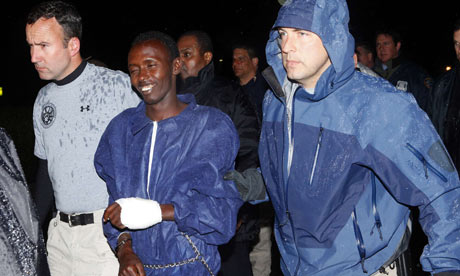
April 22
A TEENAGED pirate captured by US forces in a high-seas drama off Somalia has been ordered to stand trial as an adult on charges that include "piracy under the law of nations".
Somali teen authorities say is the lone survivor of a failed pirate attack faces charges of hostage taking and piracy in a federal court in Manhattan.Abdi Wali Abdi Khadir Muse, wearing a blue T-shirt and with head lowered as he entered the court with an interpreter, faces a mandatory sentence of life in prison if convicted on the most serious charge, prosecutors said.
Judge Andrew Peck ruled the young Somali would be tried as an adult after rejecting a claim by the defendant's father that Muse was only 15 years old. Prosecutors said he was over 18.
“Mr Muse's father's testimony was not credible,” said Peck. “The court ruled that the defendant must be treated as an adult.”
The five charges filed against Muse were piracy “under the law of nations,” conspiracy to seize a ship by force, conspiracy to take hostages, and discharging and brandishing a firearm in the course of a hostage-taking.
Muse was one of four Somali pirates who swarmed the US container ship Maersk Alabama on April 8, and later fled taking its American captain, Richard Phillips, as a hostage in a small life boat.
Muse, who prosecutors described as the group's leader, was taken into custody April 12 after he boarded the USS Bainbridge to demand safe passage in return for Phillips's release.
On the fifth day of the ordeal, US Navy snipers shot dead the other three pirates and rescued Phillips.
Flown to New York, a smiling Muse was led by federal agents past a bank of media cameras and into New York's Federal Plaza in a driving rainstorm after his arrival.
His left hand was heavily bandaged with white gauze, the result of an injury sustained aboard the Maersk Alabama when a US crewmember stabbed him during a struggle for control of the freighter.
The Maersk Alabama saga captured the world's attention and vividly highlighted the dangers posed by low-tech pirates in some of the world's most strategic shipping lanes.
The incident was highly unusual because the unarmed, all-American crew fought back and prevented the pirates from taking control of their vessel.
Phillips returned home to Vermont last welcome to a hero's welcome.
An issue surrounding Muse's capture and the unusual decision to try him in the US courts was his age.
Reports out of New York said he was 19. But Voice of America reported that his father, Abdilkadir Muse, said his son was 16 years old, and had not been in previous trouble.
A court-appointed lawyer Phil Weinstein told the court he had spoken to the alleged pirate's father by telephone.
“He says his son was born on November 20, 1993,” which would make him 15, Weinstein said.
The Washington Post reported that if Muse is indicted by a grand jury it would be the first major test in years of American anti-piracy laws, which date back to the 19th century.
“Trying pirates in the US for an attack on an American vessel makes more sense than any other scenario I can think of,” piracy law expert Samuel Menefee told The Washington Post.
“If there are any problems with American law, certainly now is the time to find out so that we can bring our law on the subject into the 21st century.”
The hijacking of the Maersk Alabama was an early test of the Obama administration and has prompted calls for tightened measures to protect US ships in the busy shipping lanes off the Horn of Africa.
One US senator, Dianne Feinstein, has called for US-flagged vessels operating in pirate-cruised waters off Somalia's coast to carry armed security teams, and has written to Mr Obama proposing the measure. “I believe that any US-flag shipping vessel operating in the Gulf of Aden or the Straits of Malacca _ or in any other high piracy zone _ should be required to have armed security teams aboard,” Senator Feinstein said.
Muse's court appearance comes as other Somali pirates released an Asian chemical tanker they captured five months ago.
But they are still holding at least 17 other ships as high-seas attacks in 2009 soared to record levels.
Source: The Australian




















